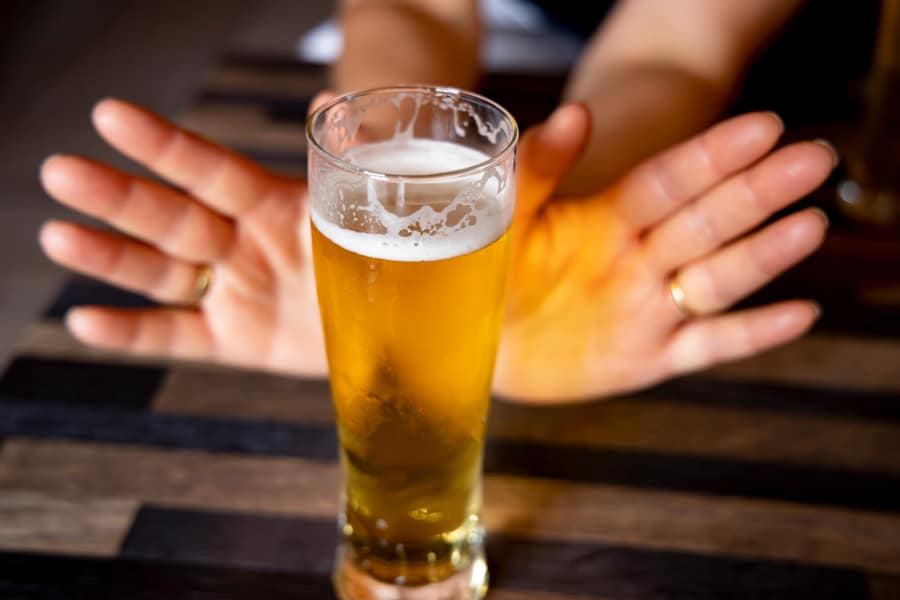Alcoholism is a devastating disease that affects millions of people worldwide. Many individuals struggling with alcohol addiction turn to non-alcoholic beer as an alternative, hoping to satisfy their cravings without the harmful effects of alcohol.
While non-alcoholic beer may seem like a safe choice for those in recovery, it comes with its own set of dangers and risks. Our sober living in Kokomo, Indiana can help you or a loved one who needs extra support in recovery. Don’t hesitate to seek professional treatment for alcohol addiction.
Does Drinking Non-Alcoholic Beer Break Sobriety?
Sobriety is commonly defined as the state of not being intoxicated or affected by alcohol or other substances. Consuming non-alcoholic beer, which has a very low alcohol content (typically less than 0.5%), would technically not break sobriety. However, there are some factors to consider when discussing non-alcoholic beer and its impact on sobriety.
First and foremost, individuals in recovery should always consult with their healthcare provider before consuming any type of alcoholic beverage, including non-alcoholic beer. This is because even small amounts of alcohol can trigger cravings and make it difficult to maintain sobriety for some individuals.
It’s also important to note that while non-alcoholic beer does not contain enough alcohol to cause intoxication or impair judgment, it still contains other ingredients that could be triggering for some individuals. For example, many non-alcoholic beers still contain hops and other flavors commonly found in traditional beers.
If you are struggling to control addictive urges after treatment, learn about the benefits of sober living. We can help you take the steps needed to achieve long-term recovery.
What Are Non-Alcoholic Adult Beverages?
Non-Alcoholic Adult Beverages are beverages that do not contain any alcohol but are targeted towards adults. These types of beverages have become increasingly popular in recent years due to the growing trend of health and wellness. They provide an alternative option for adults who want to enjoy a drink without consuming alcohol.
Non-Alcoholic Adult Beverages can come in various forms such as:
- Mocktails
- Non-alcoholic beer, wine, spirits
- Energy drinks
- Virgin mojitos and other frozen drinks
- Non-alcoholic sparkling wine
- Zero-proof cocktails
These drinks are often made with natural ingredients and offer a wide range of flavors and options for individuals to choose from. These drinks can be enjoyed at social events or can make a refreshing beverage on their own.
How are Non-Alcoholic Adult Beverages Made?
Some popular non-alcoholic adult beverages include mocktails, which are essentially alcohol-free versions of traditional cocktails. These can be made by combining various juices, sodas, and flavored syrups to create a refreshing and flavorful drink.
Other non-alcoholic adult beverages are made using alternative fermentation methods. For example, kombucha is a fermented tea that’s popular as a non-alcoholic alternative to beer or wine. Kefir is another fermented beverage that is made from milk (or water) and has a tangy taste similar to yogurt.
Additionally, many companies have started producing non-alcoholic versions of popular alcoholic drinks such as wine and beer.
Understanding Sobriety and Non-Alcoholic Beer
Those in recovery need to understand that non-alcoholic beer still contains trace amounts of alcohol. The average beer contains 14 grams of alcohol while the average non-alcoholic beer contains one gram. Consuming large quantities could potentially trigger cravings for stronger alcoholic beverages.
Many people who are in recovery from alcohol addiction find that drinking non-alcoholic beer helps them feel like they are still participating in social situations where others may be drinking conventional alcoholic beverages. It provides a sense of normalcy and can be a useful tool in maintaining sobriety.
This social aspect is why many people consider sober living for a certain period of time. Sober living homes provide private rooms, utilities, and career support. Our staff is excited to help you overcome the hold of addiction.
The Possible Dangers of Non-Alcoholic Beer
Non-alcoholic beer can present as a good alternative to alcoholic drinks. However, there are some pitfalls that need to be considered.
- Misleading Labeling: Non-alcoholic beer is often marketed as a healthy beverage, and some people may assume that it contains no alcohol at all. However, most non-alcoholic beers still contain small amounts of alcohol because it is extremely difficult (if not impossible) to fully remove all of it.
- Cross-Addiction: While the amount of alcohol in these beverages is minimal, it can still trigger cravings and potentially lead to relapse in those with a history of addiction. This can lead to taking on a new addiction to a different substance that produces similar effects to alcohol.
- Negative Health Effects: Contrary to popular belief, non-alcoholic beer is not necessarily healthier than regular beer. It still contains calories and carbohydrates, which can contribute to weight gain if consumed in excess. Additionally, the process of removing alcohol from the beer may result in added sugars and preservatives.
- Masking Other Underlying Issues: Some people may use non-alcoholic beer as a way to hide their excessive drinking habits, not addressing the key issues at the heart of their addiction. This can prevent them from seeking proper help and addressing these issues as part of recovery.
Psychological Implications of Drinking Non-Alcoholic Beer
Many individuals in recovery may turn to non-alcoholic beer as a substitute for their alcohol cravings.But various psychological implications come with drinking non-alcoholic beer, many of which may not be immediately obvious.
The Placebo Effect and Sobriety
The placebo effect refers to the phenomenon where a person experiences a positive physiological or psychological response, despite receiving a treatment that has no active ingredients. They may believe that since it looks and tastes like regular beer, it will have a similar effect on them. The placebo effect can be so powerful that some individuals may feel intoxicated after consuming non-alcoholic beer, even though there is no alcohol present.
Triggers and Cravings in Sobriety
Another psychological implication of drinking non-alcoholic beer is the potential for triggers and cravings in sobriety. For many individuals, certain situations or emotions can act as triggers for their past drinking behaviors. These triggers can be anything from being around friends who are drinking to feeling stressed or anxious.
Non-alcoholic beer itself may act as a trigger for some individuals, especially if they were heavy drinkers before entering recovery. The taste and smell of the beverage may bring back memories associated with drinking alcohol, which could lead to intense cravings.
How to Manage Alcohol Cravings
Drinking non-alcoholic beverages is one way to cope with cravings for alcohol. But it’s more important to face the reasons behind your addiction and deal with the cravings long-term.
- Identify Triggers: The first step in managing alcohol cravings is to identify the triggers that lead to them. These could be situations, emotions, or people that make you want to drink. It could be stress at work, a fight with your partner, or hanging out with friends who drink heavily. Take note of these triggers and try to avoid them as much as possible.
- Practice Mindfulness: Mindfulness is the practice of being fully present in the moment without judgment. When a craving arises, instead of giving in to it, try to observe it without acting. Notice how your body feels and the thoughts that come up without getting caught up in them.
- Seek Support: Having a strong support system can be crucial in managing alcohol cravings. Reach out to family members, friends, or support groups for encouragement and accountability when you feel tempted to drink.
- Find Alternative Coping Mechanisms: Alcohol may have been your go-to coping mechanism in the past, but there are healthy alternatives that can help you deal with difficult emotions or situations without turning to alcohol. Some ideas include exercising, meditating, talking to a therapist, or journaling.
- Set Realistic Goals: Trying to eliminate all alcohol cravings may not be realistic or sustainable in the long term. Instead, set achievable goals for yourself (such as avoiding drinking in certain situations).
Alcohol Addiction Treatment
Alcohol addiction is a serious condition that affects millions of people around the world. It is characterized by a strong craving for alcohol, an inability to control or limit alcohol consumption, and negative consequences from drinking. Fortunately, inpatient treatment centers and sober living facilities can help individuals overcome alcohol addiction and regain control of their lives.
Detoxification
The first step in alcohol addiction treatment is often detoxification. This involves ridding the body of all traces of alcohol and managing any withdrawal symptoms that may occur. Detoxification can be done on an inpatient or outpatient basis, depending on the severity of the individual’s addiction.
Therapy Services
Once detoxification is complete, therapy and counseling are essential components of alcohol addiction treatment. This can include individual therapy, group therapy, and support groups such as Alcoholics Anonymous (AA). Therapy helps individuals understand the underlying causes of their addiction and develop coping mechanisms to prevent relapse.
Medication-Assisted Treatment (MAT)
Medications may also be used as part of alcohol addiction treatment. These medications can help reduce cravings for alcohol and manage withdrawal symptoms. They are often used in conjunction with therapy for optimal results.
It’s important to remember that recovery from alcohol addiction is a lifelong process. It requires commitment, dedication, and ongoing support. With proper addiction resources, it is possible to overcome alcohol addiction and live a healthy, sober life.
Seek Recovery at Monroe Street Sober Living
Monroe Street Sober Living is a premier sober living facility that provides a safe and supportive environment for individuals seeking to overcome addiction. Our program focuses on personalized treatment plans, individual and group therapy, and a variety of holistic activities to promote healing and personal growth.
Seeking recovery at Monroe Street Sober Living means committing to positive change. Contact us today and start your journey toward a healthier, happier life.



Recent Comments